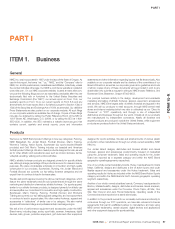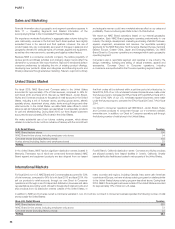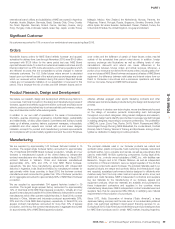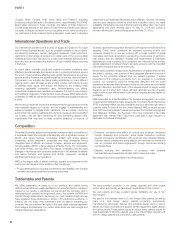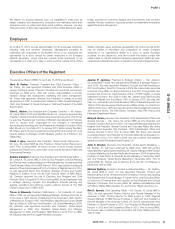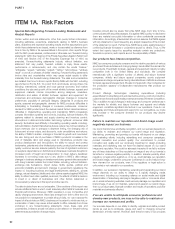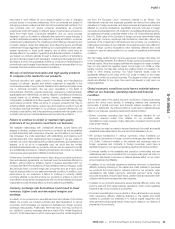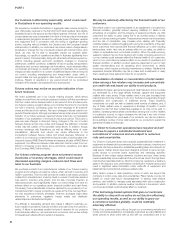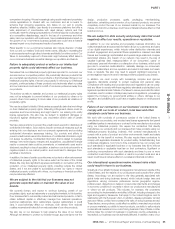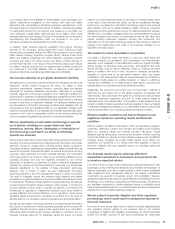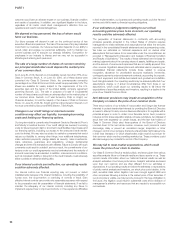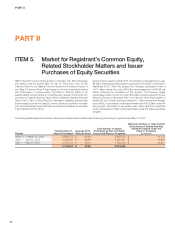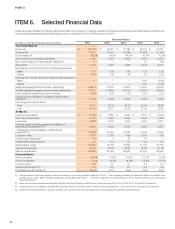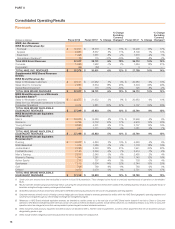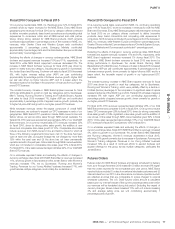Nike 2016 Annual Report Download - page 14
Download and view the complete annual report
Please find page 14 of the 2016 Nike annual report below. You can navigate through the pages in the report by either clicking on the pages listed below, or by using the keyword search tool below to find specific information within the annual report.
PART I
our products due to the availability of transportation, work stoppages, port
strikes, infrastructure congestion or other factors, and costs and delays
associated with consolidating or transitioning between manufacturers, could
adversely impact our financial performance. In addition, manufacturing delays
or unexpected demand for our products may require us to use faster, but
more expensive, transportation methods such as air freight, which could
adversely affect our profit margins. The cost of oil is a significant component in
manufacturing and transportation costs, so increases in the price of
petroleum products can adversely affect our profit margins.
In addition, Sojitz America performs significant import-export financing
services for the Company. During fiscal 2016, Sojitz America provided
financing and purchasing services for NIKE Brand products sold in certain
NIKE markets including Argentina, Uruguay, Brazil, Canada, India, South
Africa and Thailand (collectively the “Sojitz Markets”), excluding products
produced and sold in the same country. Any failure of Sojitz America to
provide these services or any failure of Sojitz America’s banks could disrupt
our ability to acquire products from our suppliers and to deliver products to
our customers in the Sojitz Markets. Such a disruption could result in
canceled orders that would adversely affect sales and profitability.
Our success depends on our global distribution facilities.
We distribute our products to customers directly from the factory and through
distribution centers located throughout the world. Our ability to meet
customer expectations, manage inventory, complete sales and achieve
objectives for operating efficiencies and growth, particularly in emerging
markets, depends on the proper operation of our distribution facilities, the
development or expansion of additional distribution capabilities and the timely
performance of services by third parties (including those involved in shipping
product to and from our distribution facilities). Our distribution facilities could
be interrupted by information technology problems and disasters such as
earthquakes or fires. Any significant failure in our distribution facilities could
result in an adverse effect on our business. We maintain business interruption
insurance, but it may not adequately protect us from adverse effects that
could be caused by significant disruptions in our distribution facilities.
We rely significantly on information technology to operate
our business, including our supply chain and retail
operations, and any failure, inadequacy or interruption of
that technology could harm our ability to effectively
operate our business.
We are heavily dependent on information technology systems and networks,
including the Internet and third-party hosted services (“information technology
systems”), across our supply chain, including product design, production,
forecasting, ordering, manufacturing, transportation, sales and distribution, as
well as for processing financial information for external and internal reporting
purposes, retail operations and other business activities. Our information
technology systems are critical to many of our operating activities and our
business processes and may be negatively impacted by any service
interruption or shutdown. For example, our ability to effectively manage and
maintain our inventory and to ship products to customers on a timely basis
depends significantly on the reliability of these information technology
systems. Over a number of years, we have implemented information
technology systems in all of the geographical regions in which we operate.
Our work to integrate, secure and enhance these systems and related
processes in our global operations is ongoing and NIKE will continue to invest
in these efforts. The failure of these systems to operate effectively, including as
a result of security breaches, viruses, hackers or other causes, or our failure to
properly maintain, protect, repair or upgrade our systems, or problems with
transitioning to upgraded or replacement systems could cause delays in
product fulfillment and reduced efficiency of our operations, could require
significant capital investments to remediate the problem and may have an
adverse effect on our reputation, results of operations and financial condition.
We also use information technology systems to process financial information
and results of operations for internal reporting purposes and to comply with
regulatory financial reporting, legal and tax requirements. If our information
technology systems suffer severe damage, disruption or shutdown and our
business continuity plans do not effectively resolve the issues in a timely
manner, we could experience delays in reporting our financial results, which
could result in lost revenues and profits, as well as reputational damage.
Furthermore, we depend on information technology systems and personal
data collection and use for digital marketing, digital commerce, consumer
engagement and the marketing and use of our digital products and services.
We also rely on our ability to engage in electronic communications throughout
the world between and among our employees as well as with other third
parties, including customers, suppliers, vendors and consumers. Any
interruption in our information technology systems may impede our ability to
engage in the digital space and result in lost revenues, damage to our
reputation, and loss of users.
The market for prime real estate is competitive.
Our ability to effectively obtain real estate to open new retail stores and
otherwise conduct our operations, both domestically and internationally,
depends on the availability of real estate that meets our criteria for traffic,
square footage, co-tenancies, lease economics, demographics and other
factors. We also must be able to effectively renew our existing real estate
leases. In addition, from time to time, we seek to downsize, consolidate,
reposition or close some of our real estate locations, which may require
modification of an existing lease. Failure to secure adequate new locations or
successfully modify leases for existing locations, or failure to effectively
manage the profitability of our existing fleet of retail stores, could have an
adverse effect on our operating results and financial condition.
Additionally, the economic environment may at times make it difficult to
determine the fair market rent of real estate properties domestically and
internationally. This could impact the quality of our decisions to exercise lease
options at previously negotiated rents and to renew expiring leases at
negotiated rents. Any adverse effect on the quality of these decisions could
impact our ability to retain real estate locations adequate to meet our targets
or efficiently manage the profitability of our existing fleet of stores, which could
have an adverse effect on our operating results and financial condition.
Extreme weather conditions and natural disasters could
negatively impact our operating results and financial
condition.
Extreme weather conditions in the areas in which our retail stores, suppliers,
customers, distribution centers and vendors are located could adversely
affect our operating results and financial condition. Moreover, natural
disasters such as earthquakes, hurricanes and tsunamis, whether occurring
in the United States or abroad, and their related consequences and effects,
including energy shortages and public health issues, could disrupt our
operations, the operations of our vendors and other suppliers or result in
economic instability that may negatively impact our operating results and
financial condition.
Our financial results may be adversely affected if
substantial investments in businesses and operations fail
to produce expected returns.
From time to time, we may invest in technology, business infrastructure, new
businesses, product offering and manufacturing innovation and expansion of
existing businesses, such as our retail operations, which require substantial
cash investments and management attention. We believe cost-effective
investments are essential to business growth and profitability. However,
significant investments are subject to typical risks and uncertainties inherent in
developing a new business or expanding an existing business. The failure of
any significant investment to provide expected returns or profitability could
have a material adverse effect on our financial results and divert management
attention from more profitable business operations.
We are subject to periodic litigation and other regulatory
proceedings, which could result in unexpected expense of
time and resources.
From time to time we are called upon to defend ourselves against lawsuits
and regulatory actions relating to our business. Due to the inherent
uncertainties of litigation and regulatory proceedings, we cannot accurately
predict the ultimate outcome of any such proceedings. An unfavorable
NIKE, INC. 2016 Annual Report and Notice of Annual Meeting 67
FORM 10-K


